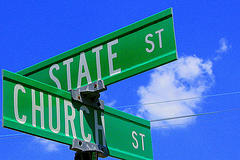Training soldiers in the culture wars
This article makes me ill. Some excerpts:
A former high-school biology teacher, Ham travels the nation training children as young as 5 to challenge science orthodoxy. He doesn’t engage in the political and legal fights that have erupted over the teaching of evolution. His strategy is more subtle: He aims to give people who trust the biblical account of creation the confidence to defend their views — aggressively.
He urges students to offer creationist critiques of their textbooks, parents to take on science museum docents, professionals to raise the subject with colleagues. If Ham has done his job well, his acolytes will ask enough pointed questions — and set forth enough persuasive arguments — to shake the doctrine of Darwin.
“We’re going to arm you with Christian Patriot missiles,” Ham, 54, recently told the 1,200 adults gathered at Calvary Temple here in northern New Jersey. It was a Friday night, the kickoff of a heavily advertised weekend conference sponsored by Ham’s ministry, Answers in Genesis.
In two 90-minute workshops for children, Ham adopted a much lighter tone, mocking scientists who think birds evolved from dinosaurs (“if that were true, I’d be worried about my Thanksgiving turkey!”).
In a bit that brought the house down, Ham flashed a picture of a chimpanzee. “Did your grandfather look like this?” he demanded.
“Noooooo!” the children called.
“And did your grandmother look like that?” Ham displayed a photo of the same chimp wearing lipstick. The children erupted in giggles. “Noooooo!”
“We are not just an animal,” Ham said. He had the children repeat that, their small voices rising in unison: “We are not just an animal. We are made in the image of God.”
Can’t we be animals and made in the image of God?

 A U.S. District Judge ruled today that
A U.S. District Judge ruled today that 